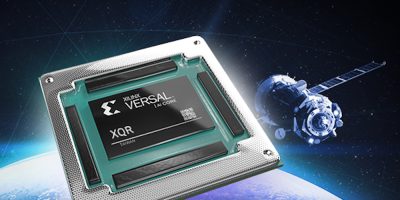AMD announces space qualification for Versal Adaptive SoCs
On-board AI processing in space is possible with the radiation-tolerant Versal AI Core devices which AMD has announced have completed Class B qualification.
The company’s first space-grade Versal adaptive SoCs are the XQR Versal AI Core XQRVC1902 range. They deliver full radiation tolerance, accelerated AI inferencing and high-bandwidth signal processing performance for satellite and space applications, said the company. The completion of Class B qualification, derived from the US military specification MIL-PRF-38535, allows the devices to begin shipping in early 2023.
Until now, highly complex AI applications could only be performed with custom-designed ASICs, which are prohibitively expensive for most space programs, said AMD at the introduction of the radiation-tolerant XQR Versal AI Core XQRVC1902 devices.
In contrast, the XQR Versal adaptive SoC supports reprogramming during development as well as after deployment, including in-flight in the harsh radiation environment of space. This permits satellite operators to change processing algorithms after a satellite has been launched, allowing for previously unavailable flexibility in remote sensing and communications applications. The radiation tolerance of the XQR Versal has been tested by AMD and independent organisations and has been determined to be capable of supporting missions from low-earth orbit to geosynchronous earth orbit and beyond.
“Raytheon is basing our next-generation space processors on the XQR Versal adaptive SoCs due to the chip’s performance in various radiation environments and its high quality levels,” said Barry Liu, senior director, space systems at Raytheon Intelligence and Space. “Its heterogeneous computing capabilities and reconfigurable logic fabric will enable our teams to integrate more on-board processing in a considerably smaller footprint, enabling unprecedented advances in system-level size, weight and power (SWaP).”
The XQR Versal AI Core adaptive SoCs offer advanced signal processing and AI inferencing capability in a heterogeneous computing platform. The devices feature dual-core Arm Cortex-A72 and dual-core Arm Cortex-R5 embedded processors, 400 AI / ML compute engines, almost 900,000 logic cells, and 191M bits of memory, all connected with a network-on-chip and fabricated on a 7nm CMOS process.
Developers can produce designs for XQR Versal devices using the AMD Xilinx Vivado tool suite and Vitis AI software platform from a variety of developer tools and industry-standard frameworks, including RTL, C and C++, Matlab, Caffe, TensorFlow, PyTorch and others.
The AMD Class B qualification and manufacturing test flow is based on the US Department of Defense MIL-PRF-38535 Class B specification for qualification and testing of monolithic integrated circuits and has been adapted for the advanced organic packaging AMD is using for XQR Versal space-grade products.




